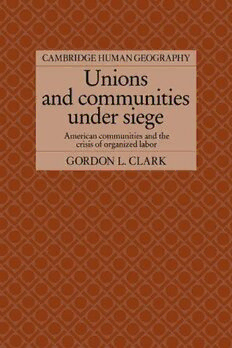
Unions and Communities under Siege: American Communities and the Crisis of Organized Labor (Cambridge Human Geography) PDF
327 Pages·2006·5.223 MB·English
Most books are stored in the elastic cloud where traffic is expensive. For this reason, we have a limit on daily download.
Preview Unions and Communities under Siege: American Communities and the Crisis of Organized Labor (Cambridge Human Geography)
Description:
The essential argument of this book is that the current crisis facing American unions has to be considered in terms of the immediate communal context of labor-management relations. The structure of New Deal national labor legislation has sustained and maintained distinctive local labor-management practices. In response to the ever-increasing economic interdependence of American and external communities, unions have found it difficult to achieve similar scales of integration, and their fragile ideal of intercommunity solidarity has often been overwhelmed by economic imperatives operating at higher levels and in other places. Three particular themes recur throughout Professor Clark's study: the role of the community in labor-management relations, the roles of state and federal institutions in adjudicating local industrial disputes, and the significance of economic restructuring for the roles and future of industrial unions.
See more
The list of books you might like
Most books are stored in the elastic cloud where traffic is expensive. For this reason, we have a limit on daily download.
